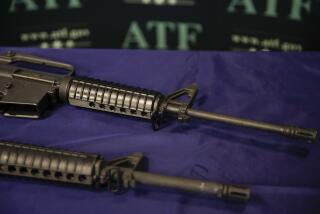Pair Plead Guilty in Case of Substitution Jet Parts
- Share via
Consolidated Aeronautics Corp. and two of its top executives pleaded guilty Monday to secretly substituting used or refurbished parts for critical safety components on a wide range of aircraft for the U.S. government.
The North Hollywood-based aerospace company faces up to $4.5 million in fines for claiming the parts it supplied for the A-7, F-104 and F-4 military jets were new and unused when at least some portions of the parts were refurbished or reconditioned.
Failure of some of the parts, which included a tail assembly for the F-104 and a key component of the A-7’s stability system, could have resulted in crashes, federal prosecutors said.
Guilty Plea on 3 Counts
Gordon Strube, 65, founder and president of the company, pleaded guilty to three counts of making false statements and claims to the federal government but claimed that he was unaware of most of the parts substitutions when they occurred. He faces a maximum of 7 1/2 years in prison.
Ronald Guy, 42, vice president of sales for the company, pleaded guilty to two false-statement charges and an additional count of conspiracy. He faces up to 15 years in prison.
Assistant U.S. Atty. William Fahey, who headed the investigation, said that contracts the company negotiated between 1984 and 1987 called for it to supply new and unused parts to the U.S. military and that company officials subsequently submitted claims certifying that the parts were new.
In fact, he said, government investigators documented that the company in several instances substituted remanufactured parts, jeopardizing critical safety systems on aircraft that would have been equipped with the parts.
No in-flight failures were documented, but at least some of the parts tested before installation failed to meet specifications, Fahey said.
The most significant problems were documented among the 1,000 “selector sets” supplied by Consolidated for the Navy’s A-7 attack jet. The parts were for the aircraft’s tail assembly, which helps keep it stable in flight. The government will introduce evidence later to show that the failure of selector sets would almost inevitably result in a crash, Fahey said.
Of the 200 parts tested, all 200 failed to withstand the pressure levels that would be experienced during a takeoff or landing, Fahey said.
Among the other parts affected by the substitutions were hook-drag chute assemblies for the F-104 for use in landing, Fahey said.
Guy’s attorney, Plato Cacheris, said company officials, in many cases, believed that they had sufficient new parts to supply the contracts when they originally negotiated them, then substituted some “newly manufactured” portions on some of the parts when new parts were unavailable.
Didn’t Think Parts Were Used
“He (Guy) does not believe now nor did he believe then that any of the parts were used,” Cacheris said.
In any case, the lawyer said, company officials knew that any parts that were unsafe would have proven to be so, long before they were used in flight, because of subsequent testing requirements.
“Any suggestion that these parts could have threatened safety are unfounded,” Cacheris said.
Strube has said he was away from the company recovering from an illness during the time when most of the substitutions occurred.
But the company founder admitted that he failed to inform the government when he learned of the substitutions.
Of the 200 parts tested, all 200 failed to withstand the pressure levels that would be experienced during a takeoff or landing.
More to Read
Inside the business of entertainment
The Wide Shot brings you news, analysis and insights on everything from streaming wars to production — and what it all means for the future.
You may occasionally receive promotional content from the Los Angeles Times.










